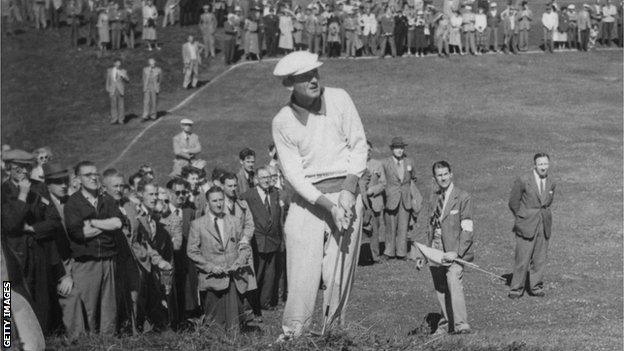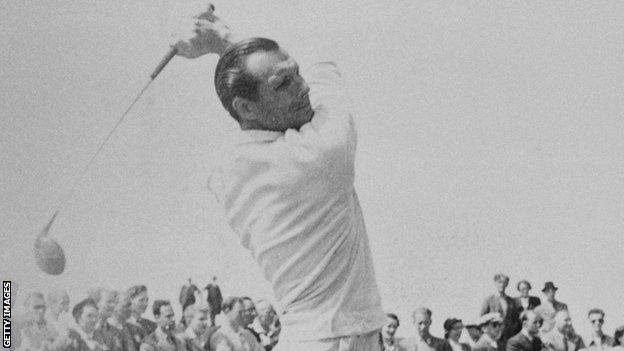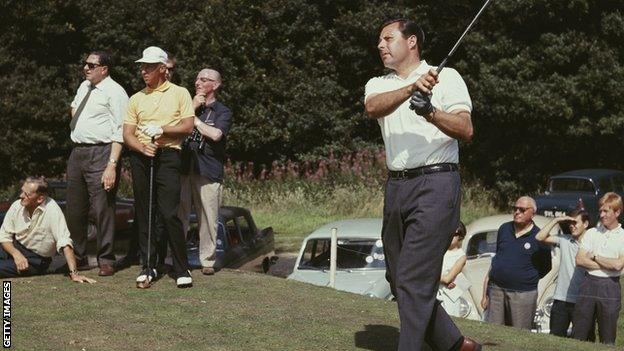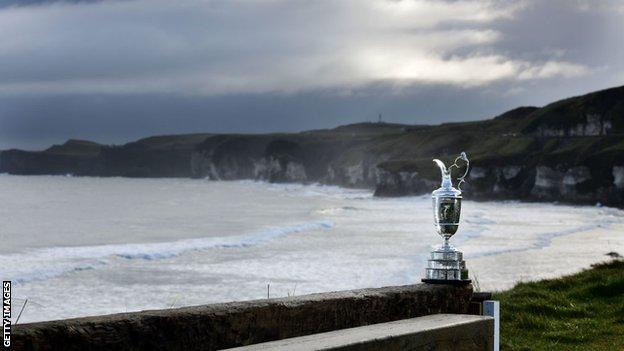The Open: Portrush '51 - Alliss' implosion and Faulkner's win
- Published

'The Open - Portrush '51' will revisit the only previous time that the Dunluce links have hosted the event
The BBC's legendary voice of golf chuckles at the memory of his 1951 Open Championship implosion.
Just six weeks after completing his national service in the RAF, a 20-year-old Peter Alliss and his brother Alec arrived at Royal Portrush alongside 181 other players battling for the Claret Jug.
But after an impressive performance in the two-round qualifier at Portstewart and Royal Portrush to seal his place in the main 72 holes of action, a night out was to sink the young Englishman's Open Championship hopes.
"I'd opened up (at Royal Portrush) with a 69 (in the second qualifying round)," the 88-year-old tells The Open - Portrush '51 which will be broadcast on BBC One Northern Ireland at 22:35 BST on Wednesday, 10 July.
"Then my brother and I went down to the town that night and met a couple of girls on holiday from London."
Feeling decidedly the worse for wear, Alliss fired a 79 on the Dunluce course the next day and after an 80 followed on the Thursday, the young man's Portrush playing adventure was over although he did stay on to see compatriot Max Faulkner win the Championship during the final 36 holes of action on the Friday.
"I realised then that if you are going to try to play properly you have got to feel (good). You can't go and do silly things."
Alliss' Open debut had come as a 16-year-old during Portrush native Fred Daly's victory at Hoylake in 1947 before he missed the next three Championships because of his national service.

Max Faulkner won the 1951 Open by two shots
With his father Percy having been one of the leading British players of the 1920 and 1930s, Alliss was quickly accepted into the professional ranks.
But even the top professional's lot in those days was nothing like the pampered existence which today's golfing millionaires enjoy.
"The war had just ended. The pro shops were empty. There were no clothes. There was no food to eat and they ran the Open Championship. I think the first prize (in 1947) was £150. Maybe two or three hundred people turned up to try and qualify for the Championship.
"I'm sure Fred Daly won the Open and went back to his club the next day. The top professionals were famous but they were nothing.
Max Faulkner's sons and son-in-law remember how he was playing back in 1951.
"You were expected to get round in a maximum three hours and 10 minutes on the Friday because you had to get home to your club to look after your members for the weekend.
"And if you won something like the Open, instead of charging five shillings for a lesson, 25 pence, you could charge 50 pence or more. But that was it.
"It was a very sort of low key thing until the sixties and you had the advent of Palmer coming and then the excitement of a new man, Nicklaus," recalls Alliss, who played for Britain & Ireland in eight Ryder Cup matches between 1953 and 1969 - including the win over the Americans at Lindrick in 1957.
The 88-year-old recalls the Portrush weather in 1951 as being a bit mixed which meant many spectators were attired in smart long raincoats and trilby hats as they walked on the fairways alongside the players.
"If you compare them to today you would think that they look as though they are going out for dinner or something but it was the same at football matches," adds one of the only two surviving competitors from the '51 championship along with Northern Irishman Norman Drew, who later joined him in the 1959 Ryder Cup team.
"The players had to battle through the crowds to get to their ball and through them again to get on the green and through again to get off the green. It was so different. I would love to be able to recreate it just one time for today's players."

Alliss played in eight Ryder Cup matched over 16 years
The week began with Faulkner, not long out of the RAF himself, being discounted as a possible contender by the other pros despite having finished tied sixth and fifth in the two previous championships at Royal St George's and Troon.
"Dai Rees came up to me, we were having a cup of tea and he said: 'Poor old Max. He can't play. We were playing for a pound but we refused to take his money'.
"This was two days before the championship started.
"But I'm not sure whether it was at Portrush, he found a bit of driftwood on the beach, it might have been an old shaft, and stuck a head on it and putted with it.
"It was so light, about as heavy as two cigarettes, and he putted beautifully on the greens and he won."

The Open is returning to Portrush after 68 years
Alliss was watching on the 16th, which will be final hole next week, when Faulkner pulled off his famous second shot onto the green in round three after being inches from going out of bounds.
"There were three strands of wire and he was trying to shuffle round so he could get a swing and eventually did and scuttled it up and I think he got a four.
"I can remember watching him get his winner's cheque. It was £300 almost double what Fred Daly got and he was waving it in the air and he said, this will pay for my son's education and his son went to Charterhouse School which is one of the great schools in England."
That was Peter Alliss' 1951 Open and he has attended every championship since then as either a player or broadcaster.